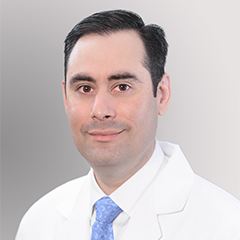Advances in GERD Treatment: First LINX Procedure in Central Florida Performed at Orlando Health
About 20 percent of Americans have gastroesophageal reflux disease (GERD), a condition in which the contents of the stomach re-enter the esophagus.
People can have GERD for a variety of reasons. Certain medications, being overweight, and being a regular smoker can increase your risk for GERD. Pregnant women also are likely to have this condition.
Treatment for GERD typically includes dietary changes, weight loss, quitting smoking and using over-the-counter medications, which just reduce acid production but do not prevent or fix reflux. However, if these treatments don’t work, surgery usually is the best option. One of these surgical approaches is called LINX, an effective treatment for many patients.
We recently performed the first ever LINX procedure in Central Florida at Orlando Health.
Treating GERD with LINX Procedure
Fundoplication, which involves wrapping the upper part of the stomach around the lower part of the esophagus to strengthen the lower esophageal sphincter, is the standard surgery for treating GERD. It is an effective procedure but is associated with the inability to vomit or belch and if ineffective, is difficult to reverse. However, LINX is another surgical option for patients.
A weak lower esophageal sphincter (LES) muscle causes acid reflux. LINX is a magnetic band that is placed around this weaken valve to prevent acid reflux. The magnetic beads within the band join together and help to keep the lower part of the esophagus closed. When you swallow, burp — or even vomit — the force of these activities cause the magnetic beads to open, allowing the esophagus to function normally.
LINX has several benefits and some risks. In a study that involved 100 patients, the most common risks were pain, stomach bloating and difficulty swallowing. Fourteen percent of patients in the study experienced stomach bloating, 24% experienced pain and 68% experienced difficulty swallowing, which occurred about one to two times per week.
However, the benefits of the procedure outweigh these risks for many patients. First, LINX is a simple outpatient procedure that involves four small incisions. It’s also less extensive operation than a fundoplication, and can be removed during minimally invasive surgery, if necessary for a patient.
Another benefit of LINX is that it is well tolerated by most patients. Patients go home the same day of surgery eating regular food. With traditional fundoplication surgery, patients must stick to a liquid diet for several weeks. Patients also have the ability to belch and vomit after the procedure — something they can’t do after fundoplication surgery.
So far, LINX has produced great results. Eighty-five percent of LINX patients stop taking acid reflux medications, 88% report elimination of heartburn and 99% report freedom from regurgitation, which occurs when food that is partly digested goes back up from the stomach and into the mouth.
GERD can lead to more serious complications if it goes untreated. It can cause inflammation of the esophagus (esophagitis); make the esophagus narrower, which leads to difficulty swallowing; and cause respiratory problems such as asthma, laryngitis, pneumonia, chest congestion and wheezing. Acid reflux also can lead to Barrett’s esophagus, a condition in which tissue similar to those found in the intestinal lining replaces the tissue lining in the esophagus. Barrett’s esophagus can lead to esophageal cancer.
GERD is a common condition, but if you experience regular heartburn, nausea, difficulty swallowing and chest or upper abdominal pain, you should see a doctor right away. Don’t let these symptoms continue indefinitely, as they could lead to more serious health problems down the road. If you’ve tried other treatments that haven’t worked, like dietary changes and acid-reducing medications, surgery may be the best solution. LINX works well for many people and helps them eat and digest their food normally without worrying about the unpleasant symptoms of GERD. If you have GERD, don’t hesitate to talk to your doctor and get the appropriate treatment.


